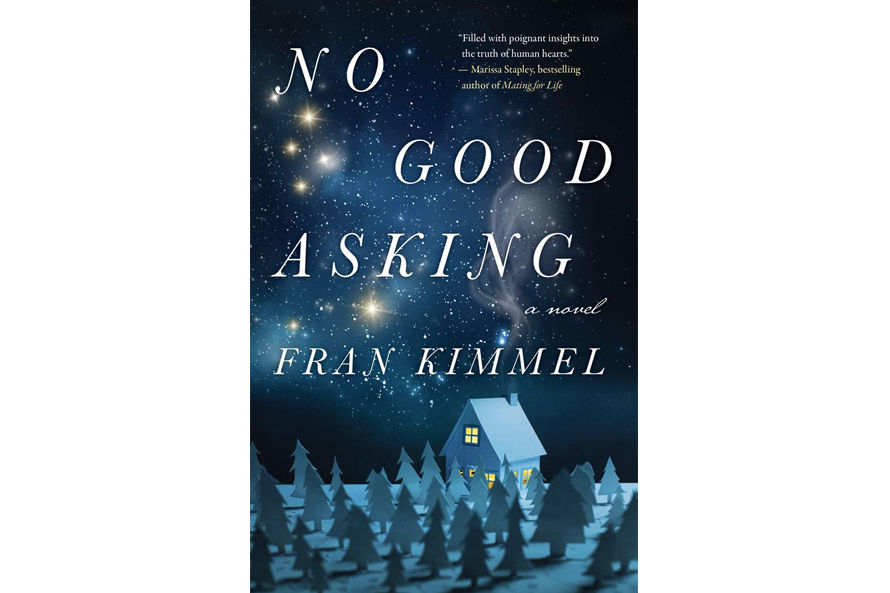
No Good Asking by Fran Kimmel
ECW Press
Review by Colin Sterling
Fran Kimmel’s latest novel No Good Asking is an unforgettable narrative that grips the reader right from its harrowing opening scene and doesn’t let go until it reaches its poignant conclusion. Intimate and engaging, it’s a wonderful read that’s impossible to forget. From the opening pages where we find eleven-year-old Hannah Finch wandering through a bitter snowstorm, the shape of her form like a “small smear of blood on a white blanket,” we care deeply about the girl’s fate. We care, in fact, about all the characters and find ourselves rooting for them to find the happiness that eludes them. This is one of Kimmel’s gifts as a writer: she brings us into the world of her characters with such a deft touch, such nuanced craft, that by the book’s final pages we feel we know the Nyland family intimately.
Set in the fictional prairie town of Neesley, the relationships between the family members are strained and fractured. The opening line on the back cover sums up the novel perfectly: What happens when a family nearing its breaking point takes in a troubled child? The family in question is the Nyland family, which consists of estranged married couple Eric and Ellie and their children: Sammy, who is on the autism spectrum, and Daniel, a moody teenager. The house is rounded out with Eric’s aging father Walter, who needs almost constant caregiving, as well as the presence of Eric’s mother Myrtle, who is dead but whose strong personality and easy competence cast a long shadow over the house.
Into this family comes the young girl, Hannah Finch. She’s a temporary foster child who leaves an indelible mark on the Nylands over the course of a week during the Christmas holidays. There are questions of abuse and neglect at the hands of Hannah’s guardian, Nigel Wilson. As fate would have it, Eric Nyland, a retired police officer, knows Nigel from childhood—as a figure who is at the heart of his own dark and troubling memories.
The characters in No Good Asking are flawed and fully realized and the family scenes feel achingly authentic. As soon as I finished the novel, I immediately missed the characters, their dynamics, and their steady movement towards a greater connection with one another. Kimmel has a talent for writing authentic family scenes that walk that fine line between tenderness and sentimentality. Even the most jaded readers will warm to the novel’s intimate family moments—they feel deserved and all too familiar to anyone who has raised children.
There are moments in the novel that feel cinematic, that sear themselves into the reader’s imagination. There is a vivid miscarriage scene in a bathtub, the moment Eric Nyland first rescues Hannah from the Wilson property next door, and the unexpected moment where Hannah breaks into angelic song in front of the Nyland family, revealing an unexpected gift. These moments feel real and unforgettable. The point of view in this book is one that is not commonly used: it switches between characters with a tight third person perspective, so we are never entirely sure whose story is being told. Once the shifting perspective is established, however, it never feels jarring or out-of-place. It works beautifully, in fact, and offers glimpses into the world of each character. For a family as fractured as this one, living their lives in separate tracts, this point-of-view makes sense.
Kimmel’s prose style feels clean and effortless which—as any writer will tell you—takes a great deal of effort to pull off. The novel explores its themes of loss and grief and the constant desire for connection in a way that will satisfy any reader. Set in a perpetual winter landscape, Fran Kimmel’s No Good Asking will warm your heart and keep you turning pages. It’s a wonderful read and one you won’t soon forget.
Colin Sterling is a recent MFA graduate from UBC’s Creative Writing Program. He is on the Editorial Board for PRISM international. He has recently completed a creative nonfiction manuscript that explores the impact of disease on a relationship and a family.